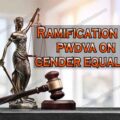
In India, maintenance laws have been criticized for disproportionately affecting men. Initially designed to support women with limited education and job opportunities, these laws have recently been used as a means of ongoing harassment for men who are separated but not yet divorced.
Case:
In the present case, the petitioner (wife) filed a petition before the Madras High Court seeking the transfer of her matrimonial proceeding from the Poonamallee court to a family court located in Trichy, where she currently resides with her parents. The respondent (husband) in the petition is employed as a public servant. The High Court granted the petitioner’s petition. However, counsel representing the respondent argued that the respondent expressed his willingness to provide for the care of the couple’s minor child, who is 11 months old, but the petitioner denied him access to the child. The respondent stated that…
“Therefore, I am not in a position to pay the interim maintenance. Unless the wife permits me to visit the child, I will not be in a position to pay the interim maintenance”
Madras High Court
After a careful examination of the evidence and arguments presented, Justice S M Subramaniam of the Madras High Court issued the following statement:
“Even if a wife has her own means of income, it will not be a bar for a court to order the husband to provide maintenance to her”
Additionally, the Judge stated,
“(Child) Visitation rights could not be linked to payment of maintenance”
Justice Subramaniam declared,
“Obligation of the husband to provide maintenance stands on a higher pedestal than the wife, even if the wife is earning, it cannot operate as a bar from being awarded maintenance by the husband
Also, courts could order payment of maintenance to a minor child even in the absence of an application for interim maintenance by the mother”
In addressing the issue of maintenance, Justice Subramaniam stated,
“Remedy of maintenance is the measure of social justice as envisaged under the Constitution to prevent the wife and the children from falling into destitution and vagrancy
The Constitution envisages social justice and positive state action for empowerment of women and children”
After a thorough evaluation of the arguments presented and determining them to be insufficient, the court ruled,
“The tenor of the husband expressed through his counsel shows his attitude and conduct. He is none other than the father of the 11-months-old female child”
Such an approach of the husband, who is a public servant, at no circumstances, be encouraged by this court”





